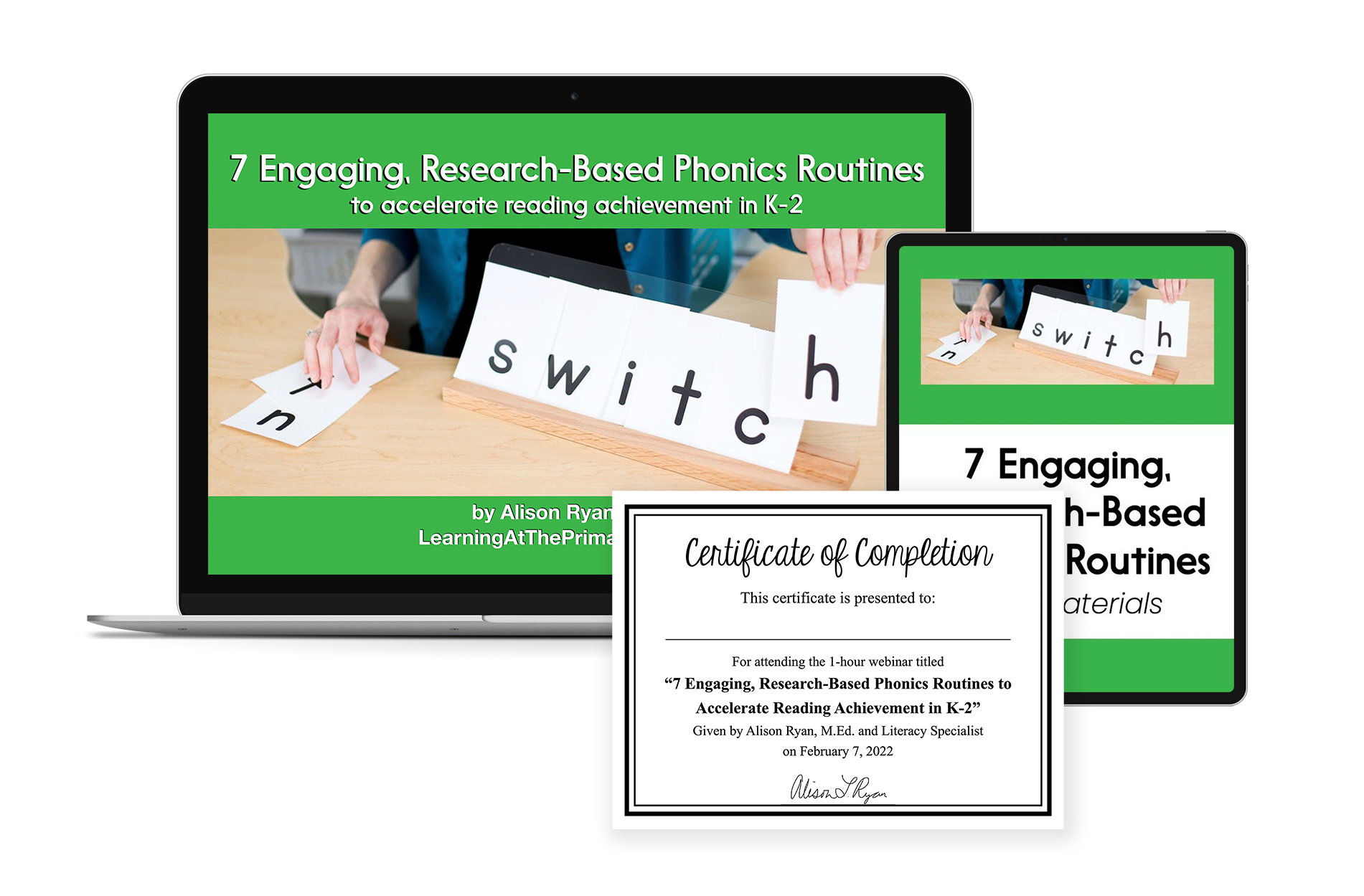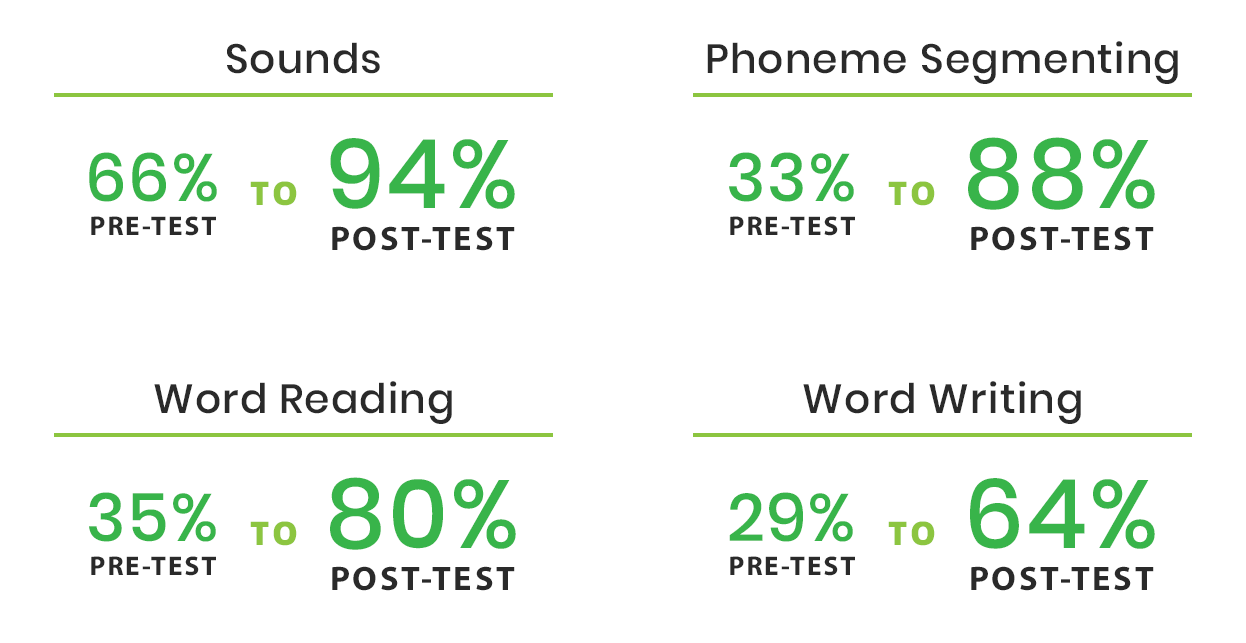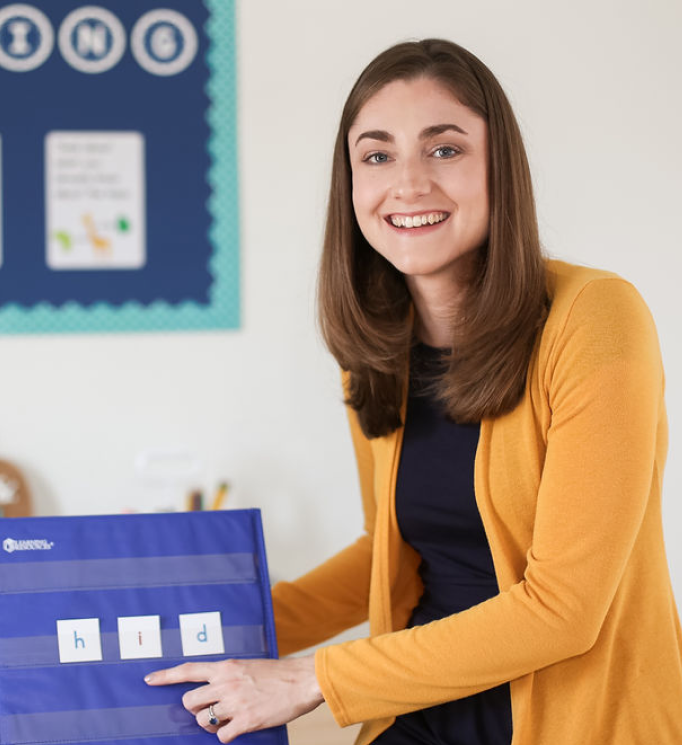"Not only have [these routines] helped me plan, they're also engaging, fun, and effective for my students! I am proud to say 100% of my students grew on their NWEA test and exceeded our class goal." - Miss S., teacher
Which of These 7 Science-Backed Routines Will Make the Biggest Difference for Your Students?
In this FREE webinar, you’ll get seven proven, science-backed phonics routines to help all your students, including your struggling readers, improve their phonics skills and get higher test scores this school year.

By registering for this workshop, you agree to receiving reminder emails about the workshop and other news and offers from Learning At The Primary Pond.
Tip: Use your personal email address to ensure you can receive our emails.

- Jennifer R.
"THIS IS AMAZING!"
"This resource has helped me set up my whole program. The webinar was extremely helpful. Thank you for taking your time so I don't have to do it all having no idea what I am doing. All I have to do is follow directions."

- Brittney S.
"Saved me hours!"
"I cannot say enough about how fantastic this webinar is! It has saved me hours of prep and it has made teaching literacy centers so much more enjoyable. The resources are so incredibly well organized and have everything I need."

- Aaron F.
"Covers everything!"
"We use both in class and also used during distance learning. This resource includes any phonics skill you could ever imagine needing! I assign students skills they are struggling with or skills that align with our phonics curriculum."
Teachers Who Use these Methods See Measurable Improvement in Their Students’ Reading Abilities... even during COVID-19!
During the 2020-2021 school year, 8 teachers shared their pre- and post-test results using the same types of methods you’ll learn in this webinar. Their score averages are shown here.
As you can see, students made incredible growth, despite the fact that many of the classrooms were forced to go virtual or hybrid due to the COVID-19 pandemic!
These 8 teachers had used the program with their Kindergarten, 1st grade, or 2nd grade students for the majority of the school year. One of the participants was a homeschool teacher. The other 7 teachers worked in schools located across the United States and Canada.
Public, private, and charter schools were represented among the classrooms in the study.
Two of the 7 classrooms were located in schools where over 50% of students are classified as coming from low-income backgrounds.
In this webinar, you’ll learn 7 powerful routines to improve your students’ engagement and results. Register today to get a printable professional development certificate and example activity absolutely you can try right away.

By registering for this workshop, you agree to receiving reminder emails about the workshop and other news and offers from Learning At The Primary Pond.
Tip: Use your personal email address to ensure you can receive our emails.

Do you know what the research says about effective phonics instruction in K-2?
If not, don't worry - you don't have to bury yourself in a textbook! I'm going to break the research down for you in this free webinar.
There's no question that the past couple of years have been difficult for everyone, especially teachers and students. Pandemic-time learning has left some students with learning gaps that will need to be addressed. But others may still be right on track. So how do you work on catching struggling students up while still supporting your other learners?
Of course, our students always have unique needs - but sometimes differentiating for them becomes challenging and overwhelming. In this webinar, I'll give you tips for how to differentiate with ease, support learners at all levels, and put research-based techniques to work for your students. Best of all, these routines aren't complicated! You'll be ready to implement them as soon as the workshop is over.
- Alison, Learning at the Primary Pond
This Webinar Covers Science-Backed Routines You Can Trust
In this free professional webinar, you’ll get a Professional Development Certificate to show that you’ve learned these seven science-backed phonics routines and why they work.
What you’ll discover when you attend is backed by research cited in:
Bear, D. R., Invernizzi, M., Templeton, S., & Johnston, F. (2015). Words Their Way: Word Study for Phonics, Vocabulary, and Spelling Instruction (6th ed.). Pearson.
Blevins, W. (2017). A Fresh Look at Phonics, Grades K-2. Thousand Oaks, CA: Corwin.
Daffern, T. (2017). What Happens When a Teacher Uses Metalanguage to Teach Spelling? The Reading Teacher, 70(4), 423–434.
Dahl, K. L., Scharer, P. L., Lawson, L. L., & Grogan, P. R. (2001). Rethinking Phonics. Portsmouth, NH: Heinemann.
Ganske, K. (2016). SAIL: A Framework for Promoting Next-Generation Word Study. The Reading Teacher, 70(3), 337–346.
Mesmer, H. A. (2019). Letter Lessons and First Words: Phonics Foundations That Work. Portsmouth, NH: Heinemann.
Miles, K. P., Rubin, G. B., & Gonzalez-Frey, S. (2018, May). Rethinking Sight Words. The Reading Teacher, 71(6), 715-726.
Morrow, L. M., & Gambrell, L. B. (Eds.). (2011). Best Practices in Literacy Instruction, Fourth Edition. New York, NY: Guilford Press.
Piasta, Shayne B. 2014. “Moving to Assessment-Guided Differentiated Instruction to Support Young Children’s Alphabet Knowledge.” The Reading Teacher 68 (3): 202-211.
Reutzel, D. R.. (2015). Early Literacy Research: Findings Primary-Grade Teachers Will Want to Know. The Reading Teacher, 69(1), 14–24.
Stahl, K. K. (2014). New insights about letter learning. Reading Teacher, 68(4), 261-265.
By registering for this workshop, you agree to receiving reminder emails about the workshop and other news and offers from Learning At The Primary Pond.
Tip: Use your personal email address to ensure you can receive our emails.



